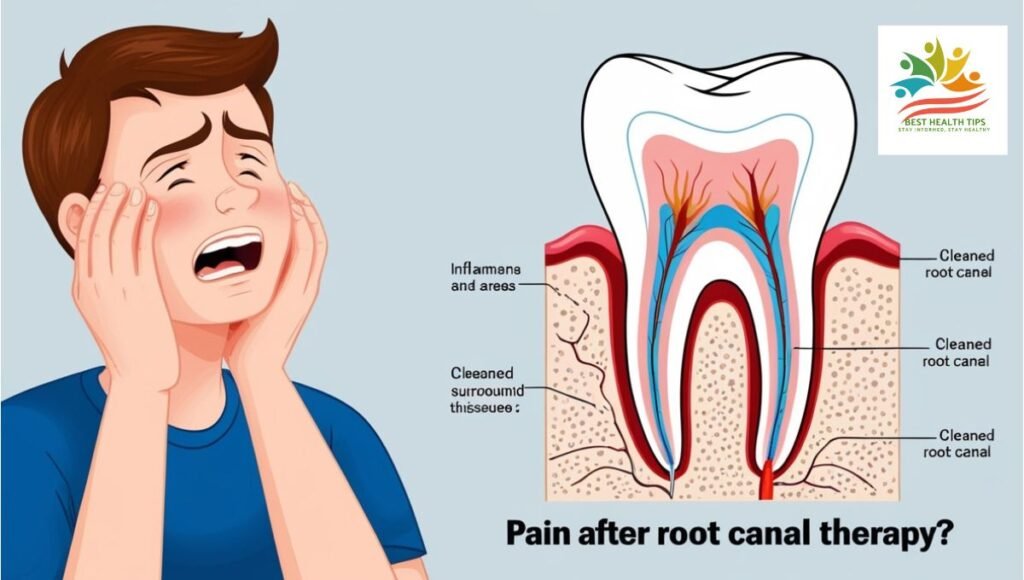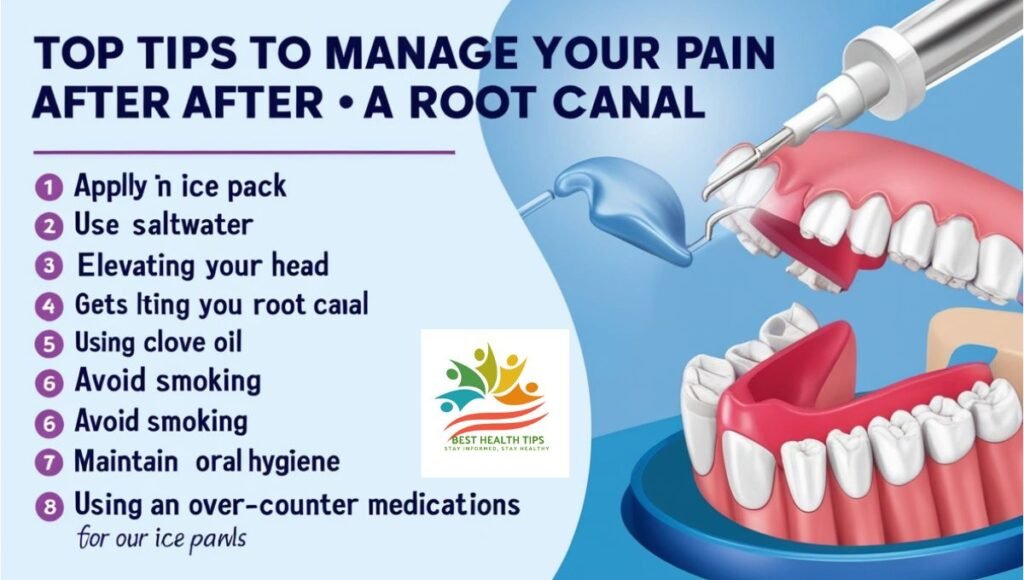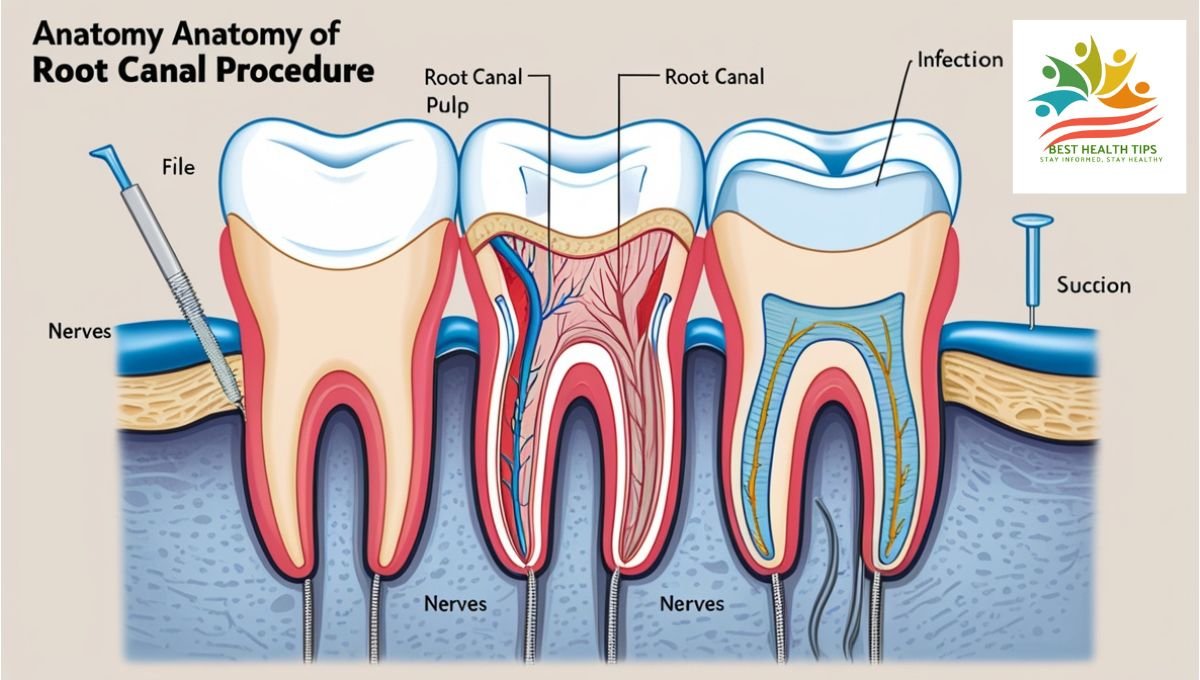Ache After Root Canal is one of the most common surgical procedures that dentists provide with the intent of saving a non-vital tooth that has been affected by decay or infection. Although using the said procedure may be uncomfortable to an extent, it can help to treat greatly painful conditions caused by a tooth infection. They will also inform why this pain should occur, how long will it occur and how to delay it to the most easily-operative style.
What is a Root Canal?
In its more technical sense, Ache After Root Canal is a dental procedure that seeks to clean out a root canal of infected pulp. The nervous and vascular tissue called pulp can be inflamed owing to caries extending deep into the tooth, multiple dental treatments, or a tooth crack.
Why is There Pain after a Root Canal?

Removing the cause of the extreme pain that comes with an infected tooth is done by a root canal; however, the moderate pain could last for a few days after the procedure. Here are some common reasons why pain occurs post-root canal.
1. Inflammation and Tissue Irritation
During the procedure, the tissues surrounding the tooth’s root may become irritated. During Ache After Root Canal treatment, the mouth is open for some time, perhaps even longer than in normal case. Severe pain associated with an infected tooth, mild to moderate discomfort may persist for several days after the procedure. Here are some common reasons why pain occurs post-root canal.
2. Gum and Jaw Soreness
The mouth remains open for an extended period during the root canal treatment. It does so to the extent that it leads to exhaustion of muscles used in chewing and inflammation of the gum padding around the jaws.
3. Minimal Injury to the Tooth’s Ligament
The tooth is connected to the gums by a ligament which can get a little damaged during the root canal treatment’s infected tooth, mild to moderate discomfort may persist for several days after the procedure. Here are some common reasons why pain occurs post-root canal:
4. Temporary Restoration
Once in a while the temporary material is a little high, so they have sensitivity when you chew or bite on it. There may be instances that after proper cleaning there are still some bacteria that stay within the tooth that causes pain several times after, mild to moderate discomfort may persist for several days after the procedure. Here are some common reasons why pain occurs post-root canal:
5. Residual Infection
In rare cases, some bacteria may remain inside the tooth even after a thorough cleaning, leading to persistent discomfort. In case the pain persists for more than a week or even gets worse than it is wise that one consult a dentist.
How Long Does the Pain Last?
The amount of time that pain is experienced by a patient after a root canal treatment also depends with the initial infection, the complexity of process, and the tolerance of the patient. Most often, the pain and inflammation should start to decrease after two to three days of infection and resolve within a week. Sometimes they may experience slight sensitivity or have a low, dull pain that lasts for weeks at most.
Below is a table summarizing the expected timeline for Ache After Root Canal pain:
| Day After Procedure | Expected Level of Pain | Recommended Actions |
| 1-3 | Mild to moderate soreness and sensitivity around the tooth | Take prescribed pain medication, use cold compresses, avoid hard foods |
| 4-7 | Diminishing discomfort, occasional dull ache | Continue with pain medication if needed, practice good oral hygiene |
| 8-14 | Minimal to no pain, some mild sensitivity may persist | Avoid chewing directly on the affected tooth until final restoration is done |
| 15+ | Pain should be gone or minimal | If pain persists or worsens, consult your dentist immediately |
Managing Pain after a Root Canal

Pain Control after a Root Canelo Non–prescription medicines such as’ ibuprofen (Advil) or acetaminophen (Tylenol) can ease some amount of pain. Ways to alleviate pain and promote a smooth recovery:
1. Over-the-Counter Pain Relief
Hear medication such as Ibuprofen, Advil, or paracetamol, Tylenol for slight to moderate pain. These medications minimise inflammation, which is the reason many patients experience discomfort following a procedure.
2. Cold Compresses
Applying a cold compress to the outside of the cheek near the treated tooth can help reduce swelling and numb the area to relieve pain. Levitate pain and promote a smooth recovery:
3. Avoiding Hard or Chewy Foods
For the first few days after the Ache After Root Canal, it is best to stick to softer foods that do not require much chewing. They also advised to stay away from things that are hard to chew, brittle, or crispy because they bring pressure to this specific tooth.
4. Sleeping with Your Head Elevated
He states that having your head raised in bed is also a useful way of preventing occurrence of swelling.er a root canal, there are effective ways to alleviate pain and promote a smooth recovery:
5. Maintaining Good Oral Hygiene
Take regular proper brushings, but avoid being harsh around the treated area and floss also gently. Taking a warm saline solution can bring some amount of relief and it is important to remember to rinse the area out. Effective ways to alleviate pain and promote a smooth recovery:
6. Using a Salt Water Rinse
Salt WATER RINSE is also recommended and will also help to decrease the inflammation of the affected area as well as cleaning it. Now spit it out and take about ½ a teaspoon of salt, adding it to a glass of warm water and swishing round the mouth.
7. Follow Your Dentist’s Instructions
Always adhere to the general care guidelines that your dentist will advise you of after the procedure. Canal, there are effective ways to alleviate pain and promote a smooth recovery:
When to Contact Your Dentist
While most post-root canal discomfort is normal and should gradually decrease, there are instances where you should reach out to your dentist:
1. Severe or Worsening Pain
If the pain intensifies after several days or returns after initially subsiding, it could indicate an unresolved infection or complications.
2. Swelling or Abscess Formation
Any signs of inflammation of gums or face, or development of abscess, which is a pocket of pus, need professional dental treatment.
3. Chronic Temperature Hypersensitivity
Patients are often advised that they may become sensitive to hot or cold foods right after a root canal. However if it lasts for several weeks it may be a sign that the infection is not totally cleared from the body.
4. Cracked or Broken Restoration
If the temporary filling or crown becomes loose, cracked or broken, you should visit your dentist for a replacement in order not to let bacteria penetrate the tooth.
Preventing Pain after Future Dental procedure
While some pain after a root canal is unavoidable, certain measures can help prevent severe discomfort and reduce the risk of future issues:
1. Regular Dental Check-Ups
Mondays meant going for checkups and dental cleaning that allow the practitioner to identify a problem before it progresses and requires extensive procedures such as the root canal.
2. Good Oral Hygiene Practices
This helps to reduce a number of conditions that may lead to tooth infections and, thus, the need to have a root canal.
3. Wearing a Mouth guard if you clench Your Teethes
In case you are a grinder or clunker, then a mouth guard is beneficial since it shields your teeth from getting to chips, cracks or any fractures. You should reach out to your dentist:
4. Severe or Worsening Pain
If the pain intensifies after several days or returns after initially subsiding, it could indicate an unresolved infection or complications.
Final Thoughts
Stinging following Ache After Root Canal is normal though the experience isn’t usually severe or long-lasting. Exactly what brings on mild discomfort and for how long does it last after the procedure? Knowing how to manage discomfort is helpful for a less painful after surgery experience It is important for you to understand that the reason for doing a root canal for example is to get rid of the infection and therefore have an opportunity to retain your sore tooth that is paining you and at the same time get relief of the painful feeling that you require at that particular time.
The remaining pain that you experience, is normally only for a short while only.
However, if the pain, swellings or any other symptoms persist, become severe or worse, you should consult your dentist. If you do the right things at the right time after a treatment so that you do not foster any unwanted side effects, your oral health will be better.
Read more about cure & Treatment and other categories at Best Health Tips.


